Module 12 Unit 2 Stay away from windows and heavy furniture课件(共37张PPT)
文档属性
| 名称 | Module 12 Unit 2 Stay away from windows and heavy furniture课件(共37张PPT) | 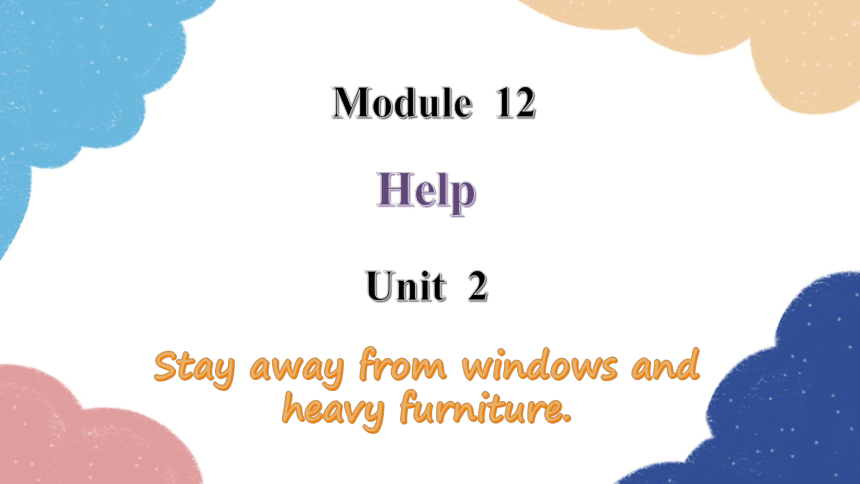 | |
| 格式 | pptx | ||
| 文件大小 | 2.2MB | ||
| 资源类型 | 教案 | ||
| 版本资源 | 外研版 | ||
| 科目 | 英语 | ||
| 更新时间 | 2022-10-05 17:20:35 | ||
图片预览

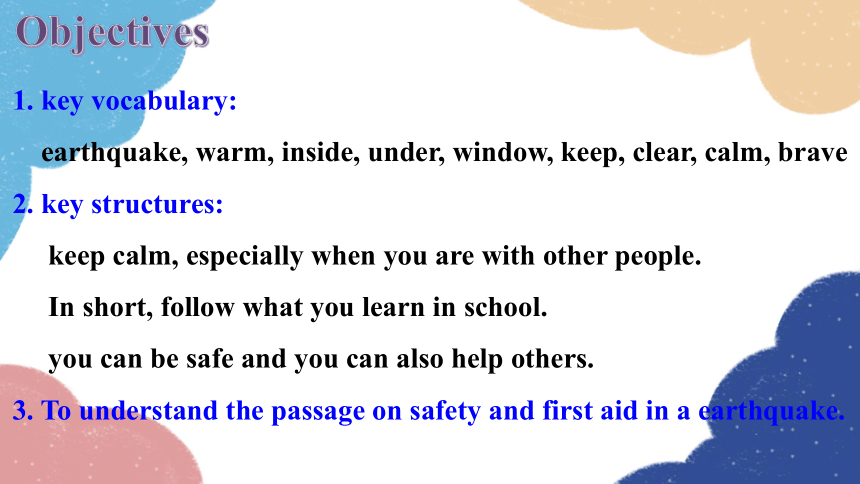

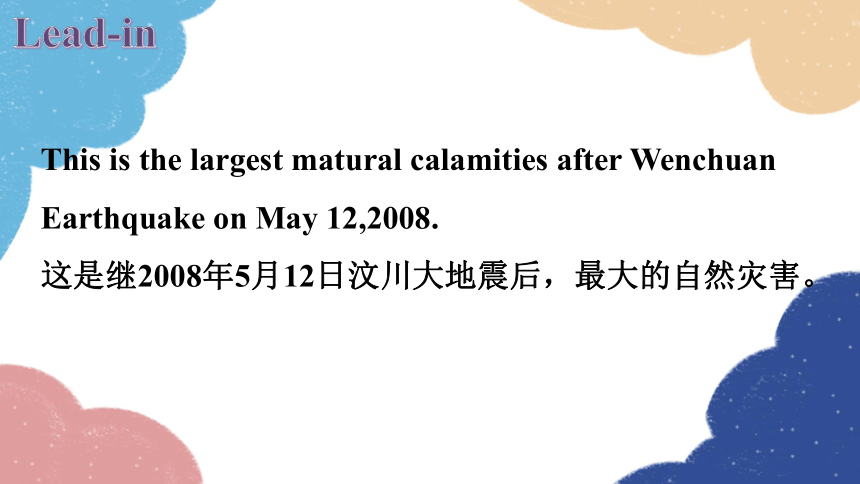
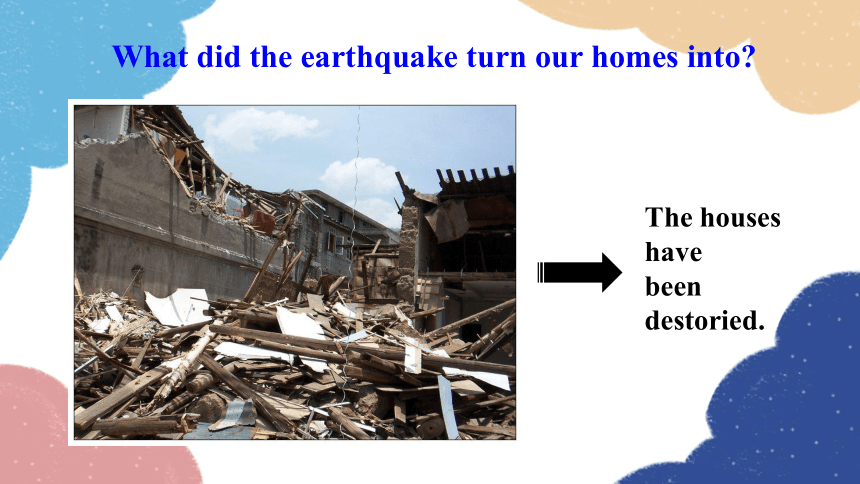
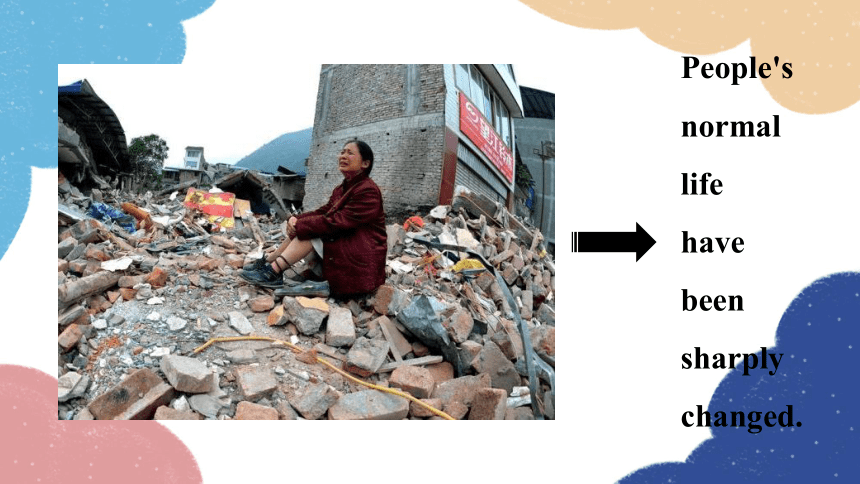
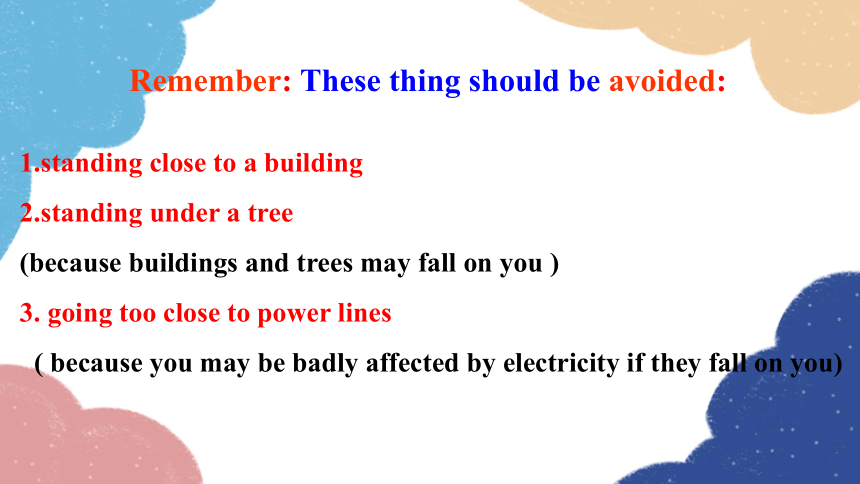
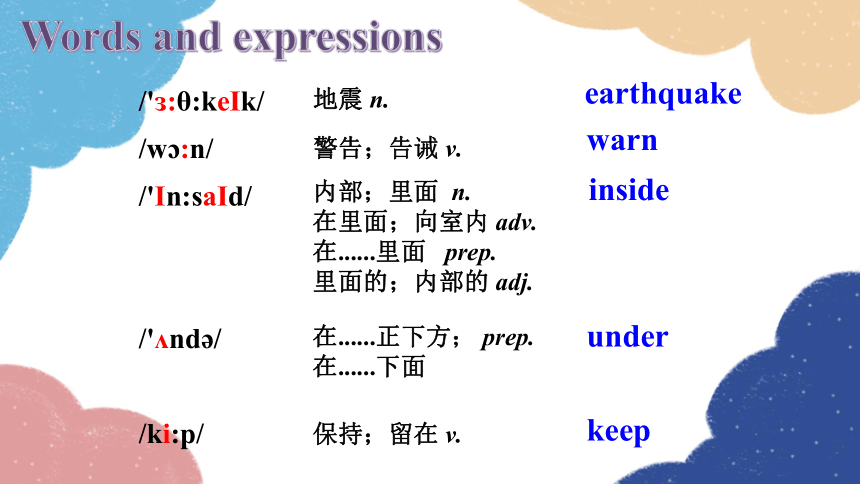
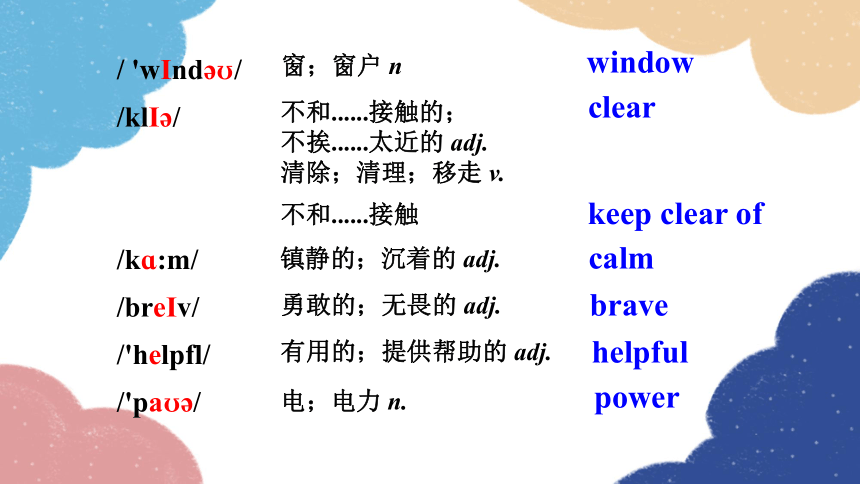
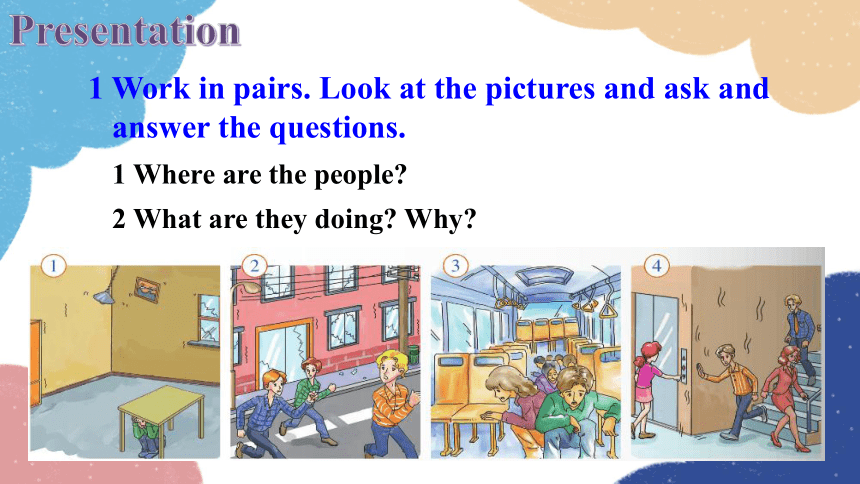
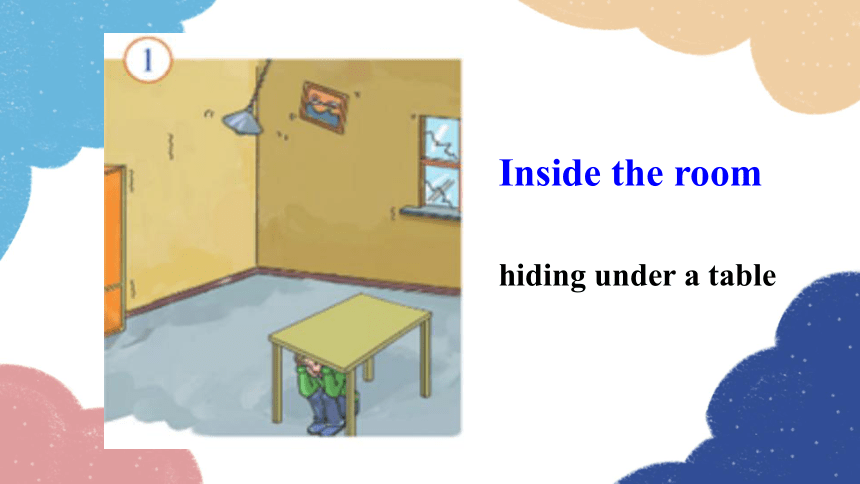
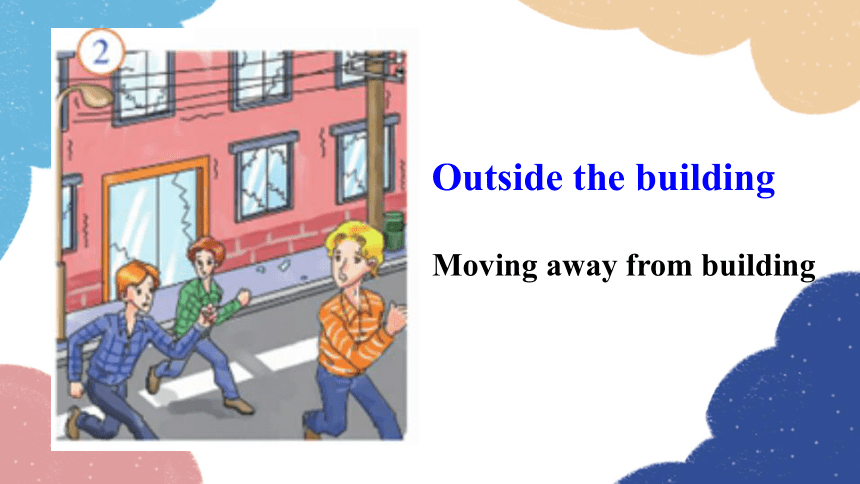
文档简介
(共37张PPT)
Unit 2
Help
Module 12
Stay away from windows and heavy furniture.
1. key vocabulary:
earthquake, warm, inside, under, window, keep, clear, calm, brave
2. key structures:
keep calm, especially when you are with other people.
In short, follow what you learn in school.
you can be safe and you can also help others.
3. To understand the passage on safety and first aid in a earthquake.
Objectives
Did you hear about these words in newspapers or on the internet
雅安,芦山县,7.0级地震
This is the largest matural calamities after Wenchuan Earthquake on May 12,2008.
这是继2008年5月12日汶川大地震后,最大的自然灾害。
Lead-in
What did the earthquake turn our homes into
The houses have
been
destoried.
People's
normal
life
have
been
sharply
changed.
Remember: These thing should be avoided:
standing close to a building
2.standing under a tree
(because buildings and trees may fall on you )
3. going too close to power lines
( because you may be badly affected by electricity if they fall on you)
/' :θ:keIk/
/w :n/
/'In:saId/
/' nd /
/ki:p/
地震 n.
earthquake
warn
警告;告诫 v.
inside
内部;里面 n.
在里面;向室内 adv.
在......里面 prep.
里面的;内部的 adj.
keep
在......正下方; prep.
在......下面
under
保持;留在 v.
Words and expressions
/ 'wInd /
/klI /
/kɑ:m/
/breIv/
/'helpfl/
/'pa /
不和......接触
镇静的;沉着的 adj.
brave
勇敢的;无畏的 adj.
power
有用的;提供帮助的 adj.
calm
电;电力 n.
helpful
window
clear
不和......接触的;
不挨......太近的 adj.
清除;清理;移走 v.
窗;窗户 n
keep clear of
1 Work in pairs. Look at the pictures and ask and
answer the questions.
1 Where are the people
2 What are they doing Why
Presentation
hiding under a table
Inside the room
Outside the building
Moving away from building
In the bus
Staying in the bus
In the building
Leaving the building but don’t use the lift.
2. Look at the title of the passage and think about
what to do in the earthquake.
Stay away from windows and heavy furniture.
What’s else
Do not jump out of high buildings.
Hide under a table!
Leave the building but don’t use the lift!
And…
What to do in an earthquake
Earthquakes always happen suddenly, so it is difficult to warn people about them. Usually people have little or no idea about what to do during an earthquake, so here is some advice:
Inside
1 Do not jump out of high buildings.
2 Hide under a table. Stay away from windows and heavy furniture. Keep clear of fire.
3 Leave the building quickly when the ground stops shaking, but do not use the lift.
4 Keep calm, especially when you are with other people. Be brave and be helpful.
3 Read the passage and check your answer to Activity 2.
keep clear of sth.
清除;摆脱;没有;不接触
Outside
1 Move away from buildings, because parts of a building may fall on you.
2 Do not stand near street lights or under power lines.
3 Stay away from bridges and trees. If you are in a bus or a car, stay in it.
4 In the mountains, be careful of falling rocks.
5 On a beach, run away from the sea and more quickly to higher ground.
In short, follow what you learnt in school. You can be safe and you can also help save others.
4 Read the sentences. Decide if the following actions
are right (√) or wrong (×).
When the earthquake started…
1 …I hid under a table.
2 …Sam sat on his desk.
3 …Alice ran out of the building.
4 …Peter and Helen stayed in their car.
5 …my family and I moved away from the beach.
√
×
×
√
√
5 Answer the questions. Use the words
and expressions in the box.
brave inside keep calm power lines
street lights warn
1 What is difficult to do before an earthquake
2 Where should you stay before the ground stops shaking
3 What should you do when you are with other people
4 What shouldn’t you stand near or under in the street
1 What is difficult to do before an earthquake
2 Where should you stay before the ground stops shaking
3 What should you do when you are with other people
4 What shouldn’t you stand near or under in the street
It’s difficult to warn people before an earthquake.
We should stay inside.
We should keep calm and be brave.
We shouldn’t stand near power lines or under street lights in the street.
Language points
Earthquakes always happen suddenly, so it is difficult to warn people about them.
地震总是发生得很突然,所以很难给予人们预警。
句中的them指的是earthquakes。
warn sb. about sth.意为“提醒/警告某人注意某事”。
如:
I was going for a swim in the sea. The people in the hotel warned me about the weather.
我要去海里游泳,宾馆里的人提醒我要注意天气。
2. Keep calm, especially when you are with other people.
保持镇静,尤其是当身边还有其他人的时候。
keep calm是系动词+形容词构成的动词短语。其他的行为动词还能作系动词的有: become, feel, look, seem 等。如:Everybody became quiet.
所有人都安静下来了。
He looked a little nervous.
他看上去有点儿紧张。
3. In short, follow what you learnt in school.
总之,按照在学校所学到的(地震)知识去做。
in short的意思是“总之,简言之”。如:
In short, I am interested in all of the sports.
总之,我对一切运动都感兴趣。
This book is, in short, an exciting story about adventures.
简言之,这本书描述的是一 个惊心动魄的探险故事。
6 Work in pairs. Do the following research.
Inside your school
Make a list of safe places and dangerous places at your
school if an earthquake happens.
Note where the nearest stairs and doors to the outside of
the school buildings are.
Outside your school
Make a list of places near your school. Note if they are
safe or dangerous.
Note where the streets go, and where street lights and
power lines are.
7 Write some instructions about what to do in an earthquake.
Go out and meet on the playground.
Do not use the lift.
Stay away from the blackboard.
You must stay away from the blackboard. It could fall on you.
Now work in pairs. Check and share your instructions.
Don’t sit under the window
You mustn’t under the window. It could break
must, can, may表示“推测”
顺口溜:
can 不肯,
may 不问,
must 肯定不否问。
can不肯,即:can (could) 一般不用于肯定句;
may不问,即:may (might) 一般不用于疑问句;
must肯定不否问,即:must一般仅用于肯定句,不用于否定句和疑问句。
Consolidation
1、表示有把握的推测时,肯定句用must (一定,准是),
否定句用can’t (不可能,一定不)。
must(can’t) + 动词原形,表示对现在情况的推测。must(can’t) + be doing, 表示对现在正在进行的情况的推测。must(can’t) + have done,表示对过去情况的推测。如:
You must be hungry after a long walk.
长途步行之后你一定饿了。
They must be waiting for us. Let’s hurry up.
他们一定在等我们。让我们快点走吧。
You must have left your bag in the theatre.
你准是把你的包丢在剧院了。
You can’t be hungry, you have just had your dinner.
你现在不可能觉得饿,你刚吃过饭。
He wears glasses all the time, his eyesight can’t be getting better.他一直带着眼镜,他的视力不可能在好转。
2、表示把握不大的推测即可能性时,用can和may,常译为“也许,可能”。may用于肯定句与否定句,一般不用于疑问句。can常用于疑问句,一般不用于肯定句。如:
The news may or may not be true.
这消息也许是真的,也许不是真的。
At the moment she may be playing with her classmates.
此刻她可能正在和同学们玩。
Anna might not have seen Tom yesterday.
安哪昨天可能没有看见汤姆。
Where can Wei Fang be 魏芳会在哪里呢?
What can they be quarrelling about
他们可能在争吵些什么呢?
Can she have lost the book 她可能已把那本书丢了?
Fill in the blanks using must / can / might.
1. –Could I borrow your dictionary
–Yes, of course you________.
2. She doesn’t answer the bell. She______ be asleep.
3. The ground is wet. It ______have rained last night.
4. He is writing with a pencil. He______ have lost his pen.
5. A computer can’t think for itself, it ______be told what to do.
can
must
must
might
must
祈使句表达说话人对对方的叮嘱、劝告、希望、禁止、建议、请求或命令等。祈使句一 般以动词原形开头,无时态和数的变化。常见的句型如下:
1. 动词原形构成的祈使句
此类祈使句喑含的主语是you,但通常省略。否定句往往由do not (don’t)或never开头。 祈使句的句首或句末有时加please,还可以加上称呼语,用逗号与句子主体隔开。
祈使句
如:
Have a nice clay! 祝你度过美好的一天!
Don’t waste your time! 别浪费时间了 !
Never be late again! 再也不要迟到了 !
Come this way please ! 请走这边。
Please be quiet, boys! 男孩们,请安静!
Make sure he’s warm. 确保他不受凉。
Don’t use the lift. 不要使用电梯。
2. let’s构成的祈使句
这类祈使句往往用于提出建议。如:
Let's spend this weekend in the countryside.
这周咱们到乡下度周末吧。
Let's take a taxi, shall we 我们坐出租车好吗?
3. 无动词祈使句
在请求、命令和口号中,常用无动词祈使句,它实际上是省略了动词,从而使语句更简洁有力。如:
Just a minute, please! 请稍等!
This way, please! 请这边走!
1. —Call me when you get home.
—OK, ____.
A. I must B. I can C. I will D. I may
2. Jim, _____ me a hand.
A. gives B. is giving C. give D. will give
3. Let me ____ on duty today.
A. am B. / C. be D. do
C
C
C
Choose the correct answer.
Practice
4. Let's ____ our time.
A. not waste B. no wasting
C. not to waste D. no waste
5. —____ higher, and you will see the house.
— OK.
A. If you stand B. To stand
C. When you stand D. Stand
6. _____ forget to write to me when you
_____ get there next Tuesday.
A. Don't; will B. Please; will
C. Please; / D. Don't; /
A
D
D
7. Please ___ do it.
A. he B. he let C. let him D. him
8. ____ come in, please.
A. Will B. Do C. Won't D. Did
9. _____ careful!
A. Be do B. Do be C. Not D. Not do
10. _____ let anyone open the door.
A. Don't B. Will C. Not D. No
C
B
B
A
Write a passage about how to protect oneself in earthquake. Use the words like earthquake, warm, inside, under, window, keep, clear, calm, brave, must, can may because and so on. About 80 words.
Homework
Unit 2
Help
Module 12
Stay away from windows and heavy furniture.
1. key vocabulary:
earthquake, warm, inside, under, window, keep, clear, calm, brave
2. key structures:
keep calm, especially when you are with other people.
In short, follow what you learn in school.
you can be safe and you can also help others.
3. To understand the passage on safety and first aid in a earthquake.
Objectives
Did you hear about these words in newspapers or on the internet
雅安,芦山县,7.0级地震
This is the largest matural calamities after Wenchuan Earthquake on May 12,2008.
这是继2008年5月12日汶川大地震后,最大的自然灾害。
Lead-in
What did the earthquake turn our homes into
The houses have
been
destoried.
People's
normal
life
have
been
sharply
changed.
Remember: These thing should be avoided:
standing close to a building
2.standing under a tree
(because buildings and trees may fall on you )
3. going too close to power lines
( because you may be badly affected by electricity if they fall on you)
/' :θ:keIk/
/w :n/
/'In:saId/
/' nd /
/ki:p/
地震 n.
earthquake
warn
警告;告诫 v.
inside
内部;里面 n.
在里面;向室内 adv.
在......里面 prep.
里面的;内部的 adj.
keep
在......正下方; prep.
在......下面
under
保持;留在 v.
Words and expressions
/ 'wInd /
/klI /
/kɑ:m/
/breIv/
/'helpfl/
/'pa /
不和......接触
镇静的;沉着的 adj.
brave
勇敢的;无畏的 adj.
power
有用的;提供帮助的 adj.
calm
电;电力 n.
helpful
window
clear
不和......接触的;
不挨......太近的 adj.
清除;清理;移走 v.
窗;窗户 n
keep clear of
1 Work in pairs. Look at the pictures and ask and
answer the questions.
1 Where are the people
2 What are they doing Why
Presentation
hiding under a table
Inside the room
Outside the building
Moving away from building
In the bus
Staying in the bus
In the building
Leaving the building but don’t use the lift.
2. Look at the title of the passage and think about
what to do in the earthquake.
Stay away from windows and heavy furniture.
What’s else
Do not jump out of high buildings.
Hide under a table!
Leave the building but don’t use the lift!
And…
What to do in an earthquake
Earthquakes always happen suddenly, so it is difficult to warn people about them. Usually people have little or no idea about what to do during an earthquake, so here is some advice:
Inside
1 Do not jump out of high buildings.
2 Hide under a table. Stay away from windows and heavy furniture. Keep clear of fire.
3 Leave the building quickly when the ground stops shaking, but do not use the lift.
4 Keep calm, especially when you are with other people. Be brave and be helpful.
3 Read the passage and check your answer to Activity 2.
keep clear of sth.
清除;摆脱;没有;不接触
Outside
1 Move away from buildings, because parts of a building may fall on you.
2 Do not stand near street lights or under power lines.
3 Stay away from bridges and trees. If you are in a bus or a car, stay in it.
4 In the mountains, be careful of falling rocks.
5 On a beach, run away from the sea and more quickly to higher ground.
In short, follow what you learnt in school. You can be safe and you can also help save others.
4 Read the sentences. Decide if the following actions
are right (√) or wrong (×).
When the earthquake started…
1 …I hid under a table.
2 …Sam sat on his desk.
3 …Alice ran out of the building.
4 …Peter and Helen stayed in their car.
5 …my family and I moved away from the beach.
√
×
×
√
√
5 Answer the questions. Use the words
and expressions in the box.
brave inside keep calm power lines
street lights warn
1 What is difficult to do before an earthquake
2 Where should you stay before the ground stops shaking
3 What should you do when you are with other people
4 What shouldn’t you stand near or under in the street
1 What is difficult to do before an earthquake
2 Where should you stay before the ground stops shaking
3 What should you do when you are with other people
4 What shouldn’t you stand near or under in the street
It’s difficult to warn people before an earthquake.
We should stay inside.
We should keep calm and be brave.
We shouldn’t stand near power lines or under street lights in the street.
Language points
Earthquakes always happen suddenly, so it is difficult to warn people about them.
地震总是发生得很突然,所以很难给予人们预警。
句中的them指的是earthquakes。
warn sb. about sth.意为“提醒/警告某人注意某事”。
如:
I was going for a swim in the sea. The people in the hotel warned me about the weather.
我要去海里游泳,宾馆里的人提醒我要注意天气。
2. Keep calm, especially when you are with other people.
保持镇静,尤其是当身边还有其他人的时候。
keep calm是系动词+形容词构成的动词短语。其他的行为动词还能作系动词的有: become, feel, look, seem 等。如:Everybody became quiet.
所有人都安静下来了。
He looked a little nervous.
他看上去有点儿紧张。
3. In short, follow what you learnt in school.
总之,按照在学校所学到的(地震)知识去做。
in short的意思是“总之,简言之”。如:
In short, I am interested in all of the sports.
总之,我对一切运动都感兴趣。
This book is, in short, an exciting story about adventures.
简言之,这本书描述的是一 个惊心动魄的探险故事。
6 Work in pairs. Do the following research.
Inside your school
Make a list of safe places and dangerous places at your
school if an earthquake happens.
Note where the nearest stairs and doors to the outside of
the school buildings are.
Outside your school
Make a list of places near your school. Note if they are
safe or dangerous.
Note where the streets go, and where street lights and
power lines are.
7 Write some instructions about what to do in an earthquake.
Go out and meet on the playground.
Do not use the lift.
Stay away from the blackboard.
You must stay away from the blackboard. It could fall on you.
Now work in pairs. Check and share your instructions.
Don’t sit under the window
You mustn’t under the window. It could break
must, can, may表示“推测”
顺口溜:
can 不肯,
may 不问,
must 肯定不否问。
can不肯,即:can (could) 一般不用于肯定句;
may不问,即:may (might) 一般不用于疑问句;
must肯定不否问,即:must一般仅用于肯定句,不用于否定句和疑问句。
Consolidation
1、表示有把握的推测时,肯定句用must (一定,准是),
否定句用can’t (不可能,一定不)。
must(can’t) + 动词原形,表示对现在情况的推测。must(can’t) + be doing, 表示对现在正在进行的情况的推测。must(can’t) + have done,表示对过去情况的推测。如:
You must be hungry after a long walk.
长途步行之后你一定饿了。
They must be waiting for us. Let’s hurry up.
他们一定在等我们。让我们快点走吧。
You must have left your bag in the theatre.
你准是把你的包丢在剧院了。
You can’t be hungry, you have just had your dinner.
你现在不可能觉得饿,你刚吃过饭。
He wears glasses all the time, his eyesight can’t be getting better.他一直带着眼镜,他的视力不可能在好转。
2、表示把握不大的推测即可能性时,用can和may,常译为“也许,可能”。may用于肯定句与否定句,一般不用于疑问句。can常用于疑问句,一般不用于肯定句。如:
The news may or may not be true.
这消息也许是真的,也许不是真的。
At the moment she may be playing with her classmates.
此刻她可能正在和同学们玩。
Anna might not have seen Tom yesterday.
安哪昨天可能没有看见汤姆。
Where can Wei Fang be 魏芳会在哪里呢?
What can they be quarrelling about
他们可能在争吵些什么呢?
Can she have lost the book 她可能已把那本书丢了?
Fill in the blanks using must / can / might.
1. –Could I borrow your dictionary
–Yes, of course you________.
2. She doesn’t answer the bell. She______ be asleep.
3. The ground is wet. It ______have rained last night.
4. He is writing with a pencil. He______ have lost his pen.
5. A computer can’t think for itself, it ______be told what to do.
can
must
must
might
must
祈使句表达说话人对对方的叮嘱、劝告、希望、禁止、建议、请求或命令等。祈使句一 般以动词原形开头,无时态和数的变化。常见的句型如下:
1. 动词原形构成的祈使句
此类祈使句喑含的主语是you,但通常省略。否定句往往由do not (don’t)或never开头。 祈使句的句首或句末有时加please,还可以加上称呼语,用逗号与句子主体隔开。
祈使句
如:
Have a nice clay! 祝你度过美好的一天!
Don’t waste your time! 别浪费时间了 !
Never be late again! 再也不要迟到了 !
Come this way please ! 请走这边。
Please be quiet, boys! 男孩们,请安静!
Make sure he’s warm. 确保他不受凉。
Don’t use the lift. 不要使用电梯。
2. let’s构成的祈使句
这类祈使句往往用于提出建议。如:
Let's spend this weekend in the countryside.
这周咱们到乡下度周末吧。
Let's take a taxi, shall we 我们坐出租车好吗?
3. 无动词祈使句
在请求、命令和口号中,常用无动词祈使句,它实际上是省略了动词,从而使语句更简洁有力。如:
Just a minute, please! 请稍等!
This way, please! 请这边走!
1. —Call me when you get home.
—OK, ____.
A. I must B. I can C. I will D. I may
2. Jim, _____ me a hand.
A. gives B. is giving C. give D. will give
3. Let me ____ on duty today.
A. am B. / C. be D. do
C
C
C
Choose the correct answer.
Practice
4. Let's ____ our time.
A. not waste B. no wasting
C. not to waste D. no waste
5. —____ higher, and you will see the house.
— OK.
A. If you stand B. To stand
C. When you stand D. Stand
6. _____ forget to write to me when you
_____ get there next Tuesday.
A. Don't; will B. Please; will
C. Please; / D. Don't; /
A
D
D
7. Please ___ do it.
A. he B. he let C. let him D. him
8. ____ come in, please.
A. Will B. Do C. Won't D. Did
9. _____ careful!
A. Be do B. Do be C. Not D. Not do
10. _____ let anyone open the door.
A. Don't B. Will C. Not D. No
C
B
B
A
Write a passage about how to protect oneself in earthquake. Use the words like earthquake, warm, inside, under, window, keep, clear, calm, brave, must, can may because and so on. About 80 words.
Homework
同课章节目录
- Module 1 How to learn English
- Unit 1 Let's try to speak English as much as possi
- Unit 2 You should smile at her.
- Unit 3 Language in use .
- Module 2 My home town and my country
- Unit 1 It's taller than many other buildings.
- Unit 2 Cambridge is a beautiful city in the east o
- Unit 3 Language in use .
- Module 3 Sports.
- Unit 1 Nothing is more exciting than playing tenni
- Unit 2 This year we training more carefully.
- Unit 3 Language in use .
- Module 4 Planes, ships and trains .
- Unit 1 He lives the farthest from school.
- Unit 2 What is the best way to travel.
- Unit 3 Language in use .
- Module 5 Lao She Teahouse.
- Unit 1 I wanted to see the Beijing Opera.
- Unit 2 It descibes the changes in Chinese society.
- Unit 3 Language in use .
- Module 6 Animals in danger.
- Unit 1 It allows people to get closer to them .
- Unit 2 The WWF is working hard to save them all.
- Unit 3 Language in use .
- Revision module A
- Module 7 A famous story
- Unit 1 Alice was sitting with her sister by the ri
- Unit 2 She was thinking about her cat.
- Unit 3 Language in use .
- Module 8 Accidents
- Unit 1 While the car were changing to red, a car s
- Unit 2 I was trying to pick it up when it bite me
- Unit 3 Language in use .
- Module 9 Population
- Unit 1 The population of China is about 1.37 billi
- Unit 2 Arnwick was a city with 200,000 people.
- Unit 3 Language in use .
- Module 10 The weathe
- Unit 1 It might snow.
- Unit 2 The weather is fine all year round.
- Unit 3 Language in use .
- Module 11 Way of life
- Unit 1 In China ,we open a gift later.
- Unit 2 In England, you usually drink tea with milk
- Unit 3 Language in use .
- Module 12 Help
- Unit 1 What should we do before help arrives?
- Unit 2 Stay away from windows and heavy furniture.
- Unit 3 Language in use .
- Revision module B
